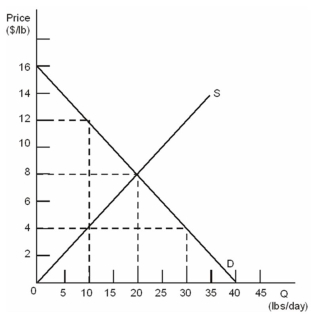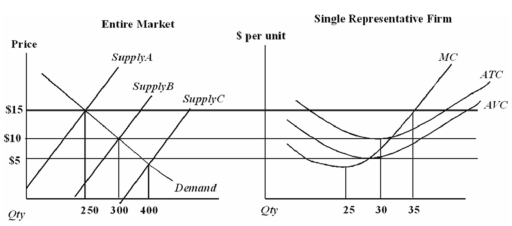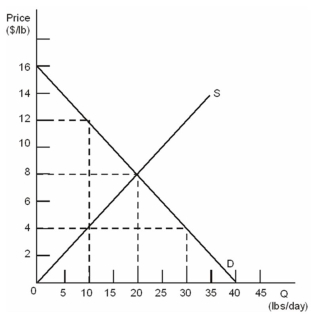A) economic profits;economic losses
B) accounting profits;accounting losses
C) accounting profits;economic losses
D) economic profits;accounting losses
Correct Answer

verified
Correct Answer
verified
Multiple Choice
Daily Supply and Demand: Oranges in Hurricane Alley  Refer to the figure above.The price of $4.00 per pound will lead to a(n) _____ of _____ pounds of oranges per day.
Refer to the figure above.The price of $4.00 per pound will lead to a(n) _____ of _____ pounds of oranges per day.
A) excess supply;20
B) excess demand;30
C) equilibrium quantity;20
D) excess demand;20
Correct Answer

verified
Correct Answer
verified
Multiple Choice
One assumption of the perfectly competitive model is that of free entry.This assumption most directly leads to the implication that:
A) firms will spend significant amounts of money on advertising.
B) positive economic profits will only be possible for in the short run.
C) firms will compete on the basis of better service and amenities rather than price.
D) a single firm will emerge as the industry leader.
Correct Answer

verified
Correct Answer
verified
Multiple Choice
Assume that all firms in this industry have identical cost functions.  Firms in this industry will shut down if the price is
Firms in this industry will shut down if the price is
A) higher in the short run than in the long run.
B) less than or equal to $15.
C) less than or equal to $10.
D) less than or equal to $5.
Correct Answer

verified
Correct Answer
verified
Multiple Choice
Which of the following would not be included in the calculation of accounting profits?
A) Wages of workers.
B) The salary the owner could have earned working elsewhere.
C) Rent.
D) Medical insurance coverage for workers.
Correct Answer

verified
Correct Answer
verified
Multiple Choice
The No Cash on the Table principle means unexploited opportunities:
A) never exist.
B) cannot be exploited for long.
C) can exist in equilibrium but rarely do.
D) always exist in equilibrium.
Correct Answer

verified
Correct Answer
verified
Multiple Choice
Price ceilings that are below the equilibrium price result in:
A) increased total economic surplus.
B) shortages.
C) surpluses.
D) the same amount of total economic surplus with a reallocation from producers to consumers.
Correct Answer

verified
Correct Answer
verified
Multiple Choice
Total economic surplus is greatest when:
A) price controls keep prices low enough that most consumers can purchase the item.
B) consumer surplus and producer surplus are equal.
C) consumer surplus exceeds producer surplus.
D) the market is in equilibrium.
Correct Answer

verified
Correct Answer
verified
Multiple Choice
The economic theory of business behavior assumes that the goal of a firm is to:
A) earn an accounting profit.
B) earn an economic profit.
C) earn maximum revenue.
D) maximize its profit.
Correct Answer

verified
Correct Answer
verified
Multiple Choice
It is always true that:
A) accounting profits are positive.
B) economic profits are zero.
C) economic profits are greater than or equal to accounting profits.
D) accounting profits greater than or equal to economic profits.
Correct Answer

verified
Correct Answer
verified
Multiple Choice
If you were to start your own business,your implicit costs would include:
A) rent that you have paid in advance for use of a building.
B) the opportunity cost of your time.
C) profit over and above normal profit.
D) interest that you pay on your business loans.
Correct Answer

verified
Correct Answer
verified
Multiple Choice
Which of the following would be an example of the rationing function of price?
A) Switching from a Ph.D.in economics to finance because finance salaries are higher
B) Bill Gates purchasing the Mona Lisa for $5 billion
C) A firm attempting to lower its explicit costs
D) Government price controls
Correct Answer

verified
Correct Answer
verified
Multiple Choice
According to the textbook,individual incentives have led to:
A) the optimal number of stock market analysts because it is a competitive market with no entry barriers.
B) too many stock market analysts because market analysis does not produce social benefits.
C) too many stock market analysts because the individual incentive to forecast faster exceeds the social benefit of a faster forecast.
D) too few stock market analysts because the efficient market hypothesis predicts that no analyst will do better than random chance in the long run.
Correct Answer

verified
Correct Answer
verified
Multiple Choice
Angelina Jolie's economic rent from starring in a movie is equal to the difference between:
A) her initial offer and her final salary,including royalties.
B) her initial offer and what she could earn in a different film.
C) her final salary and the average for leading actresses.
D) her final salary and the least she would be willing to accept for a role.
Correct Answer

verified
Correct Answer
verified
Multiple Choice
The cumulative difference between the price producers actually receive and the price for which they are willing to produce is:
A) producer surplus.
B) lost surplus.
C) total economics surplus.
D) consumer surplus.
Correct Answer

verified
Correct Answer
verified
Multiple Choice
Excess demand in a market is evidence of:
A) Pareto efficiency.
B) the opportunity for surplus-enhancing trades.
C) an economic pie that is too small.
D) equilibrium.
Correct Answer

verified
Correct Answer
verified
Multiple Choice
Daily Supply and Demand: Oranges in Hurricane Alley  Refer to the figure above.If the supplier sells the tenth pound of oranges to the most eager buyers for $8,the seller is _____ better off than before and the buyer is ______ better off than before.
Refer to the figure above.If the supplier sells the tenth pound of oranges to the most eager buyers for $8,the seller is _____ better off than before and the buyer is ______ better off than before.
A) $8;$0
B) $6;$2
C) $4;$4
D) $2;$6
Correct Answer

verified
Correct Answer
verified
Multiple Choice
If owners of a business are receiving total revenues just sufficient to cover all their explicit and implicit costs,they are:
A) doing better than their next best alternative.
B) earning a normal profit.
C) earning economic losses.
D) doing worse than their next best alternative.
Correct Answer

verified
Correct Answer
verified
Multiple Choice
Normal profits occur when:
A) accounting profits are positive.
B) economic profits are positive.
C) economic profits are zero.
D) total revenues are greater than explicit and implicit costs.
Correct Answer

verified
Correct Answer
verified
Multiple Choice
Unlike economic profits,economic rents:
A) can be less than zero.
B) can't be easily driven to zero by entry.
C) don't involve the idea of opportunity costs.
D) only apply to land.
Correct Answer

verified
Correct Answer
verified
Showing 41 - 60 of 115
Related Exams